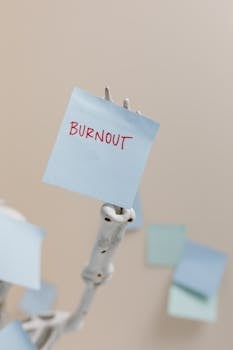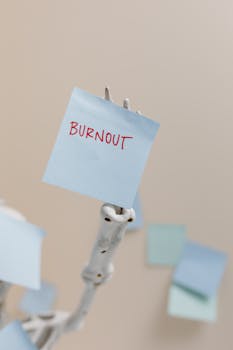- 1. Understanding Anxiety and Depression
- 2. 1. Professional Help: Therapy and Medication
- 3. 2. Lifestyle Changes: Nutrition and Physical Activity
- 4. 3. Mindfulness and Meditation
- 5. 4. Building a Support System
- 6. 5. Establishing a Routine
- 7. 6. Limiting Substance Use
- 8. 7. Sleep Hygiene
- 9. 8. Seeking Help in Crisis Situations
- 10. FAQ

“`html
Effective Strategies for Managing Anxiety and Depression
Anxiety and depression are two of the most prevalent mental health disorders affecting millions of people worldwide. According to the National Institute of Mental Health (NIMH), approximately 21 million adults in the U.S. experience at least one major depressive episode each year, and anxiety disorders affect 40 million adults. Managing these conditions effectively is crucial for improving quality of life. In this blog post, we will explore effective strategies for managing anxiety and depression, supported by research and real-world examples.
Understanding Anxiety and Depression
Before diving into effective management strategies, it’s important to understand what anxiety and depression entail. Anxiety is characterized by excessive worry, fear, or nervousness, while depression involves persistent feelings of sadness, hopelessness, and a lack of interest in activities.
1. Professional Help: Therapy and Medication
One of the most effective strategies for managing anxiety and depression is seeking professional help. Therapists and psychiatrists can provide valuable support through various treatment options.
- Cognitive Behavioral Therapy (CBT): CBT is a widely used form of therapy that helps individuals identify and change negative thought patterns. Research published by the American Psychological Association shows that CBT can be as effective as medication for treating anxiety and depression.
- Medication: Antidepressants and anti-anxiety medications can be effective for many individuals. A healthcare provider can help determine the best course of medication tailored to your needs.
2. Lifestyle Changes: Nutrition and Physical Activity
Making positive lifestyle changes can significantly impact mental health. A well-balanced diet and regular physical activity are essential components of managing anxiety and depression.
Nutrition
Research indicates that certain nutrients can influence brain health and mood. Foods rich in omega-3 fatty acids, antioxidants, and vitamins can help alleviate symptoms. For instance:
- Omega-3 Fatty Acids: Found in fish like salmon and in flaxseeds, these can improve mood and cognitive function.
- Fruits and Vegetables: A diet rich in colorful fruits and vegetables can provide essential vitamins and minerals that support brain health.
Physical Activity
Regular exercise is one of the most effective ways to combat anxiety and depression. According to a study published in JAMA Psychiatry, individuals who engage in regular physical activity experience lower rates of depression and anxiety. Aim for at least 30 minutes of moderate exercise most days of the week.
3. Mindfulness and Meditation
Mindfulness practices, such as meditation and yoga, can be powerful tools for managing anxiety and depression. These techniques encourage individuals to focus on the present moment, reducing stress and enhancing overall mental well-being.
- Meditation: Studies show that regular meditation can lead to significant reductions in anxiety and depression symptoms. Apps like Headspace and Calm offer guided sessions for beginners.
- Yoga: Combining physical movement with mindfulness, yoga has been shown to lower stress levels and improve mood. A review published in Psychological Bulletin found that yoga can be effective in reducing symptoms of anxiety and depression.
4. Building a Support System
Having a strong support system is crucial for managing anxiety and depression. Surrounding yourself with understanding friends and family can provide emotional support and encouragement. Here are some ways to build and maintain a support network:
- Join Support Groups: Many communities offer support groups where individuals can share experiences and coping strategies. Websites like NAMI (National Alliance on Mental Illness) provide resources to find local support groups.
- Open Communication: Don’t hesitate to share your feelings with trusted friends or family members. Open dialogue can foster understanding and reduce isolation.
5. Establishing a Routine
Creating and maintaining a daily routine can provide structure and a sense of normalcy for those dealing with anxiety and depression. A consistent schedule helps manage time effectively and can reduce feelings of chaos.
- Prioritize Tasks: Break tasks into smaller, manageable steps and prioritize them. This can make overwhelming tasks feel more achievable.
- Set Realistic Goals: Establish achievable goals for each day, whether related to work, personal interests, or self-care.
6. Limiting Substance Use
Substance use can exacerbate symptoms of anxiety and depression. Limiting or eliminating alcohol, caffeine, and recreational drugs can lead to improved mood and anxiety levels.
- Alcohol: While some may use alcohol to cope, it is a depressant that can worsen symptoms.
- Caffeine: High caffeine intake can increase anxiety levels. Consider reducing consumption if you notice heightened anxiety symptoms.
7. Sleep Hygiene
Quality sleep is crucial for mental health. Poor sleep can exacerbate anxiety and depression symptoms. Here are some tips for improving sleep hygiene:
- Establish a Sleep Schedule: Go to bed and wake up at the same time each day, even on weekends.
- Create a Relaxing Bedtime Routine: Engage in calming activities before bed, such as reading or taking a warm bath.
- Limit Screen Time: Reduce exposure to screens at least an hour before bedtime to promote better sleep.
8. Seeking Help in Crisis Situations
If you or someone you know is in crisis, it is essential to seek help immediately. The National Suicide Prevention Lifeline offers 24/7 support and resources for individuals in distress. Remember, reaching out for help is a sign of strength.
FAQ
What are the first signs of anxiety and depression?
Common early signs include persistent sadness, withdrawal from social activities, changes in sleep patterns, irritability, and difficulty concentrating.
Can anxiety and depression be treated without medication?
Yes, many individuals successfully manage anxiety and depression through therapy, lifestyle changes, and mindfulness practices without medication. However, it’s important to consult with a healthcare provider for personalized advice.
How long does it take to feel better after starting treatment?
Treatment timelines can vary. Some people may notice improvements in a few weeks, while others may take months. Consistency in treatment is key for effectiveness.
Are there any natural remedies for anxiety and depression?
Some individuals find relief through natural remedies such as herbal supplements (like St. John’s Wort), essential oils, and acupuncture. Always consult a healthcare professional before trying new treatments.
Managing anxiety and depression is a multifaceted journey that requires a blend of professional guidance, lifestyle changes, and personal support. By implementing these effective strategies for managing anxiety and depression, individuals can take significant steps toward improving their mental health and overall well-being.
“`
